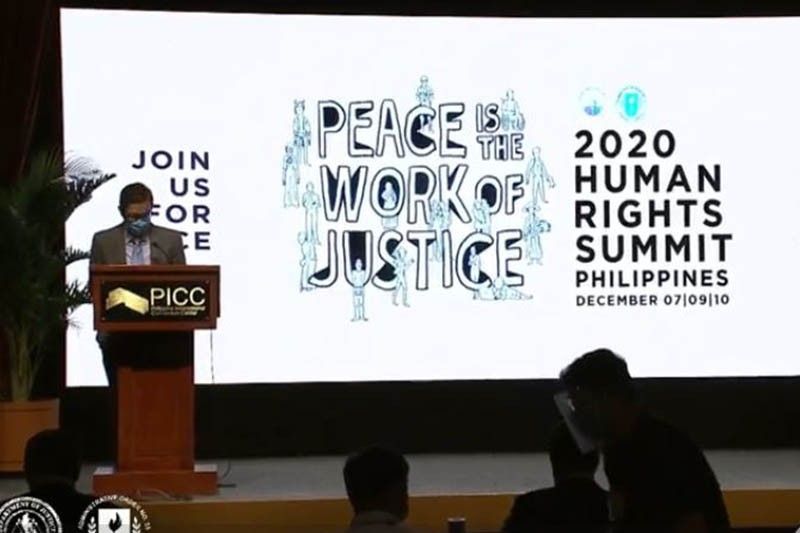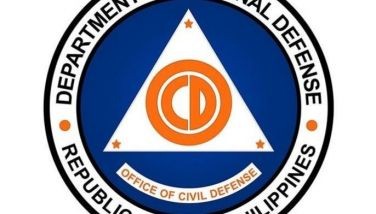CHR hopes talk at human rights summit will be felt on the ground

MANILA, Philippines — Dialogues and summits on human rights led by government agencies should translate to better protections on the ground, the Commission on Human Rights said.
This, as the Department of Justice led a three-day summit on the protection and promotion of human rights.
“Of course any effort of the government to be able to talk about human rights in proper perspective is something we will always welcome as a national human rights institute,” CHR Commissioner Karen Gomez-Dumpit said in a forum organized by rights group Karapatan Tuesday.
Karapatan, which the government has repeatedly accused of being a front for communist rebels, was excluded from the summit.
While the summit is a good effort, all these talks should lead to “more concrete improvement of the situation on the ground,” Gomez-Dumpit stressed.
“It's useless to talk about human rights when we see continuously violations, we see continued killings on the ground, we see red-tagging being perpetrated by high level officials of the government," she said.
"When we talk about human rights, we also have to act accordingly."
Latest government figures put the number of alleged drug personalities killed in the war on drugs at 5,942. But it is significantly lower than the estimates by human rights watchdogs of as many as 27,000 killed.
The CHR, in its report in July, said that Duterte, through his statements, “created a dangerous fiction that it is legitimate to hunt down and commit atrocities against human rights defenders because they are enemies of the State.”
The National Task Force to End Local Communist Armed Conflict (NTF-ELCAC) also labels activists and progressive lawmakers as communist rebels.
“It's always welcome but everything has to redound to improvement of human rights situation on the ground,” Gomez-Dumpit said of the rights summit.
Technical cooperation
With the theme “Peace is the Work of Justice,” the summit spearheaded by the DOJ would discuss “important” human rights issues, including human rights guarantees under the contentious Anti-Terrorism Act of 2020, Justice Secretary Menardo Guevarra said in a message to reporters last week.
Six webinars, which are open to the public and livestreamed on Facebook, would be held on December 7, 9 and 10.
The event is one of the projects in a joint program on technical cooperation between the Philippine government and the United Nations pursuant to the latest resolution adopted by the UN Human Rights Council.
In October, the 47-member council adopted by consensus a resolution on technical assistance and capacity building to improve the human rights situation in the Philippines, falling short of the call of human rights group to launch an independent and on-the-ground probe into the situation in the Philippines.
Lack of victims' perspective
Karapatan Secretary-General Cristina Palabay said the lack of victims' perspectives is a “very crucial weakness” of the human rights summit.
“The summit will deal on the recommendations for reforms of justice system in the country. But the first level is to know what is needed, what is lacking on the ground, what needs to be filled up, what is happening, being experienced by victims on the ground,” Palabay said Tuesday.
Karapatan and the Ecumenical Voice for Peace and Human Rights in the Philippines earlier said that their network of rights defenders were not invited to the summit and neither were victims of alleged abuses.
Guevarra confirmed Karapatan and EcuVoice were not invited to the summit.
“But these groups may be invited to participate in future activities,” he told Philstar.com.
Representatives from the Commission of Human Rights, Ateneo Human Rights, International Criminal Court and the House committee on human rights were invited to participate in the discussions.
'Ironic' meet
In a statement Monday, Karapatan said holding a government-led human rights summit is ironic because of ongoing restrictions on fundamental freedoms.
It said that while the summit is ongoing, extrajudicial killings allegedly committed by state forces are ongoing, attacks on government critics, dissenters and journalists increase, and Sen. Leila De Lima remains behind bars.
“As this summit is being held, Duterte's terror law hangs like a Damocles sword on the exercise of free speech, press freedom, the freedom of association, and the right to political dissent, as we descend to lowest of lows in the government's human rights record,” Palabay said.
In his keynote speech Monday, Guevarra defended the contentious anti-terrorism legislation, which is facing at least 37 legal challenges at the Supreme Court.
He said there are safeguards included in the law's implementing rules and regulations to ensure it would serve its purpose “without invading the cherished rights and prerogatives of people under a functioning democracy.”
But rights defenders, lawyers, activists, educators, lawmakers and other critics of the law said its vague but overbroad provisions could be used to clamp down on dissenters.
Duterte: I don't care about human rights
The summit came only days after President Rodrigo Duterte said he does not care about human rights.
"All addicts have guns. If there's even a hint of wrongdoing, any overt act, even if you don't see a gun, just go ahead and shoot him," he said in Filipino, addressing enforcers of the law,” last week.
But in a taped speech Monday, Duterte said he is “proud” that the Philippines is among the countries that signed many of the world's core human rights treaties, saying this affirms the government's “serious commitment in honoring and fulfilling our treaty obligations and prioritizing human rights agenda.”
He also said the work to attaining a “healthy human rights environment for all” is far from over.
Ahead of Human Rights Day, watchdog CIVICUS Monitor downgraded the state of democratic freedoms in the Philippines from “obstructed” to “repressed” due to the vilification of activists, attacks on human rights defenders and journalists, and the passage of the anti-terrorism law.
In a report last June, the United Nations Human Rights said the vilification of dissent and attacks against perceived critics of the Philippine government are being “increasingly institutionalized and normalized in ways that will be very difficult to reverse.” — with a report from Kristine Joy Patag
- Latest
- Trending




























